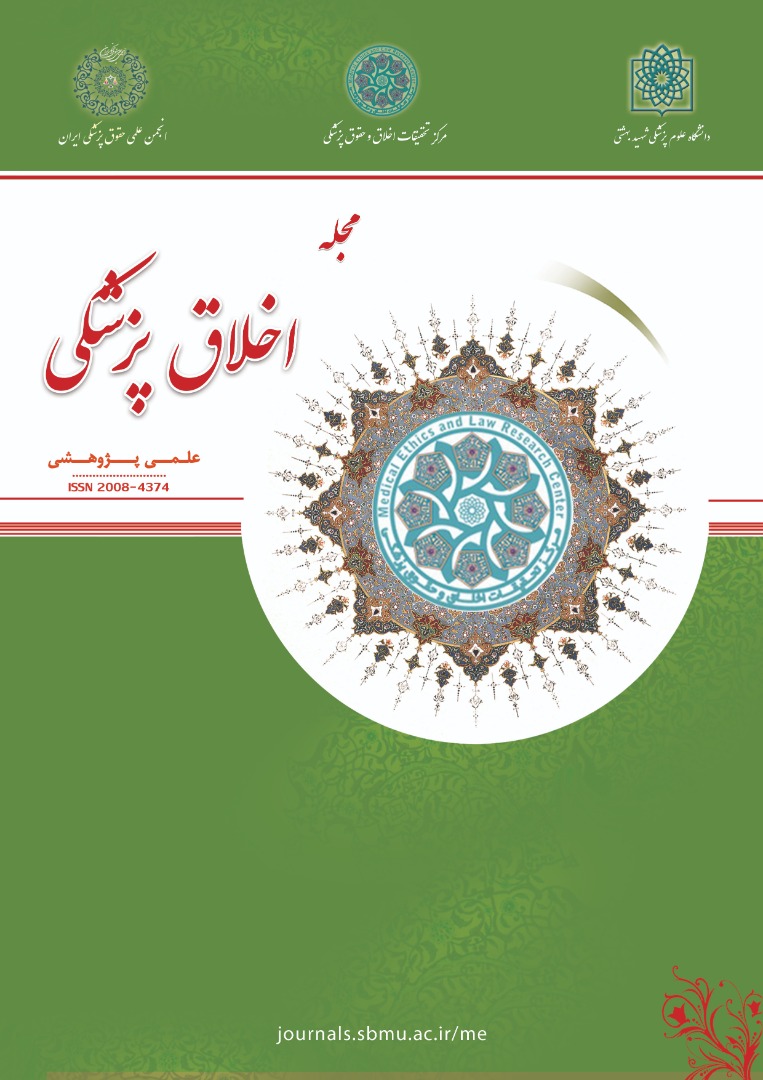ارائه مدلي جهت هدايت مشاورين اخلاقي در بخش مراقبتهاي ويژه
مجله اخلاق پزشکی - علمی پژوهشی,
دوره 2 شماره 6 (1387),
26 April 2016
,
صفحه 155-172
https://doi.org/10.22037/mej.v2i6.12178
چکیده
طب بالینی، با چالشهاي اخلاقي فراواني همراه است. علیرغم در دسترس بودن مشاورين اخلاق پزشكي، 95 درصد از پزشكان با تضاد اخلاقي در چالش هستند. اكثر پزشکان نه تنها تجربهای از مشاوره اخلاقی ندارند بلكه از وجود چنین کمیتههایی آگاهی نداشته و یا تمایلی به استفاده از آنها ندارند. شاید یکی از علل عدم رغبت آنها به استفاده از مشاورههای اخلاقی، نبودن ملاکهایی جهت تعیین بهترین افراد برای این کار و مشکوک بودن متخصصین به صلاحیت آنهاست.
مشکلات مطرح شده توسط خانوادهها ميتواند باعث عدم ارتباط مؤثر با پزشکان معالج در بخشهای ویژه شود. يكي از مهمترين اقدامات كميتههاي اخلاق بالینی، كمك به حل تضادهاي اخلاقي در بخشهاي ويژه ميباشد بهبود ارتباطات میتواند منجر به کاهش تضاد و افزایش رضایت بیمار و خانواده و تيم مراقبت شود. مراحل پيشنهادي جهت بهبود ارتباطات میان بیمار و خانوادهاش و اعضای تیم مراقبت و حل تضاد شامل هفت مرحله زير است: آمادگی برای بحث، آگاهی به قوانین مربوط به بیمار و خانواده، تعیین چگونگی جمعآوری اطلاعات، ارائه اطلاعات، پاسخ به عواطف ، تعیین اهداف و اولویتبندی درمان و طرح یک برنامه مراقبتي برای بیمار و تیم مراقبت است. به همین دلیل مشاورین اخلاقی موظف به ایجاد شرایطی برای مكالمه آزاد بین بیمار و پزشک میباشند تا اطلاعات صحیح به بیمار داده شود و از درک غلط وی از اطلاعات نیز جلوگیری شود. يكي از مزاياي مدل مشاوره اخلاقی تسهيل در حل تضاد اخلاقي است که بر خلاف مدلهای مستبدانه، افراد را به تفکر و امید واداشته و تصميمگيري باليني را تحمیل نمیکند. کمیتههای اخلاقی بیمارستانی با داشتن مهارتهای خاص میتواند تضادها را حل نماید و سبب بهبود نتایج بالینی و افزایش رضایت بیمار شوند.
- مشاوره اخلاقی؛ ارتباط پزشک و بیمار؛ کمیته های اخلاق بالینی
ارجاع به مقاله
مراجع
-Aulisio M, Chaitin E, Arnold R Ethics and palliative care consultation in the intensive care unit. Crit Care Clin. 2004; 20: 505–23.
-Duval G, Sartorius L, Clarridge B, Gensler G, Danis MWhat triggers requests for ethics consultations? J Med Ethics. 2001; 27(suppl I): i24–9.
-Gacki-Smith J, Gordon E Resident’s access to ethics consultations: knowledge, use and perceptions. Acad Med. 2005; 80: 168–75.
-Dipanjan B. principles and procedures of medical ethics case consultation.Birit J of Hos Med.2007; 68(3):140-44.
-Dobrin, a Moral reasoning of members of hospital ethics committees: a pilot study. J Clin Ethics. 2003; 14: 270–5.
-Duval G, Clarridge B, Gensler G, Danis M A national survey of U.S. internists’ experiences with ethical dilemmas and ethics consultation. Gen Intern Med 2004; 19: 251–8.
-Breen C, Abernathy A, Abbott K, Tulsky JA Conflict associated with decisions to limit life sustaining treatment in intensive care units. J Gen Intern Med. 2001; 16: 283–9.
-Rosenbaum J, Bradley E, Holmboe E, Farrell MH, Krumholz HM Sources of ethical conflict in medical house staff training: a qualitative study. Am J Med. 2004; 116: 402–7.
-Schneiderman L, Gilmer T, Teetzel H Impact of ethics consultations in the intensive care setting: A randomized, controlled trial. Crit Care Med. 2000; 28: 3920–24.
-Forde R, Vandvik I Clinical ethics, information and communication: review of 31 cases from a clinical ethics committee. J Med Ethics. 2005; 31: 73–7.
-Azoulay E, Chevret S, Lelou G et al Half the families of intensive care unit patients experience inadequate communication with physicians. Crit Care Med. 2000; 28: 3044–9.
-Curtis JR, Engelberg RA, Wenrich MD, Au DH Communication about palliative care for patients with chronic obstructive pulmonary disease. J Palliat Care. 2005; 21: 157–64.
-Mularski R, Heine C, Osborne M, Garzini L, Curtis JR Quality of dying in the ICU: ratings by family members. Chest. 2005; 128: 280–7.
-Lilly C, DeMeo D, Sonna L et al an intensive communication intervention for the critically ill. Am J Med. 2000; 109: 469–75.
-Von Gunten C, Ferris F, Emanuel LL The patient-physician relationship. Ensuring competency in end-of-life care: communication and relational skills. JAMA. 2000; 284: 3051–7.
-Davies L, Hudson L Why don’t physicians use ethics consultation? J Clin Ethics. 1999; 10: 116–25.
-Dunn N Practical issues around putting the patient as the center of care. J R Soc Med. 2003; 96: 325–7.
-Quill T, Brody H Physician recommendations and patient autonomy: finding a balance between physician power and patient choice. Ann Intern Med. 1996; 125: 763–9.
-Aulisio M, Arnold R, Youngner S Health Care Ethics Consultation: Nature, goals and competencies. Ann Intern Med. 2000; 133: 59–69.
-Vaszar L, Raffin T, Kuschner W Hospital ethics case consultations practical guidelines. Comp Ther. 2005; 31: 35–9.
-Fox E, Myers S, Pearlman R Ethics consultation in U.S. hospitals: a national survey. [Abstract] National Meeting of the American Society for Bioethics and Humanities, 2002; Baltimore, MD
-Swenson M, Miller R Ethics Case Review in Health Care institutions: Committees, Consultants or teams? Arch Intern Med. 1992; 152: 694–7.
-Phillips D Ethics consultation quality: Is evaluation feasible? JAMA. 1996; 275: 1866–7.
-Veterans Health Administration National Center for Ethics in Health Care Ethics consultation: responding to ethics concerns in health care. Available at: http://www1.va.gov/integratedethics/download/Ethics_Consultation_Primer.pdf accessed 28 June 2006.
-LaPuma J, Stocking C, Darling R, Siegler M Community hospital ethics consultation: evaluation and comparison with a university hospital service. Am J Med. 1992; 92: 346–5.
-Lo B Answers and questions about ethics consultations. JAMA. 2003; 290: 1208–10.
- چکیده مشاهده شده: 353 بار
- PDF دانلود شده: 141 بار
